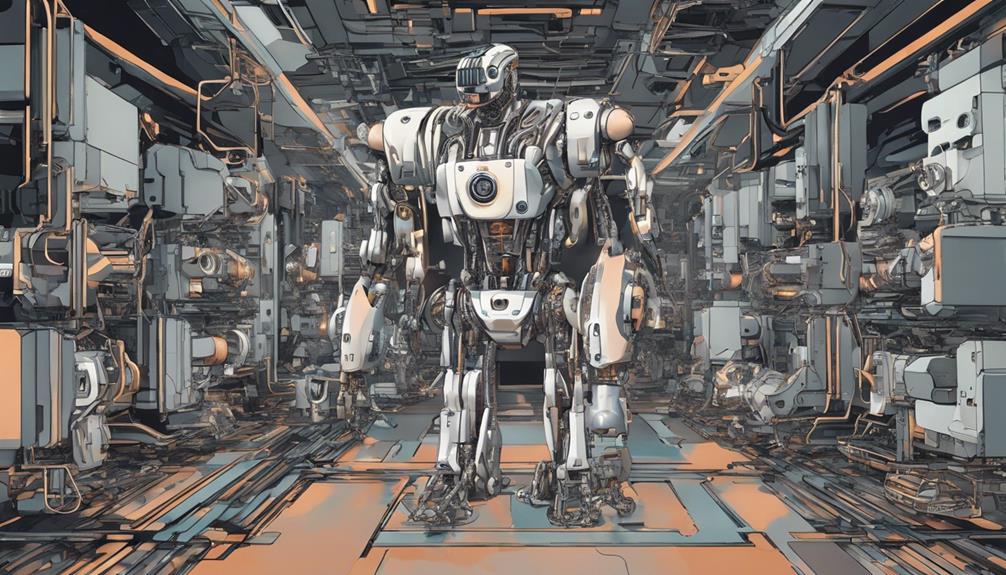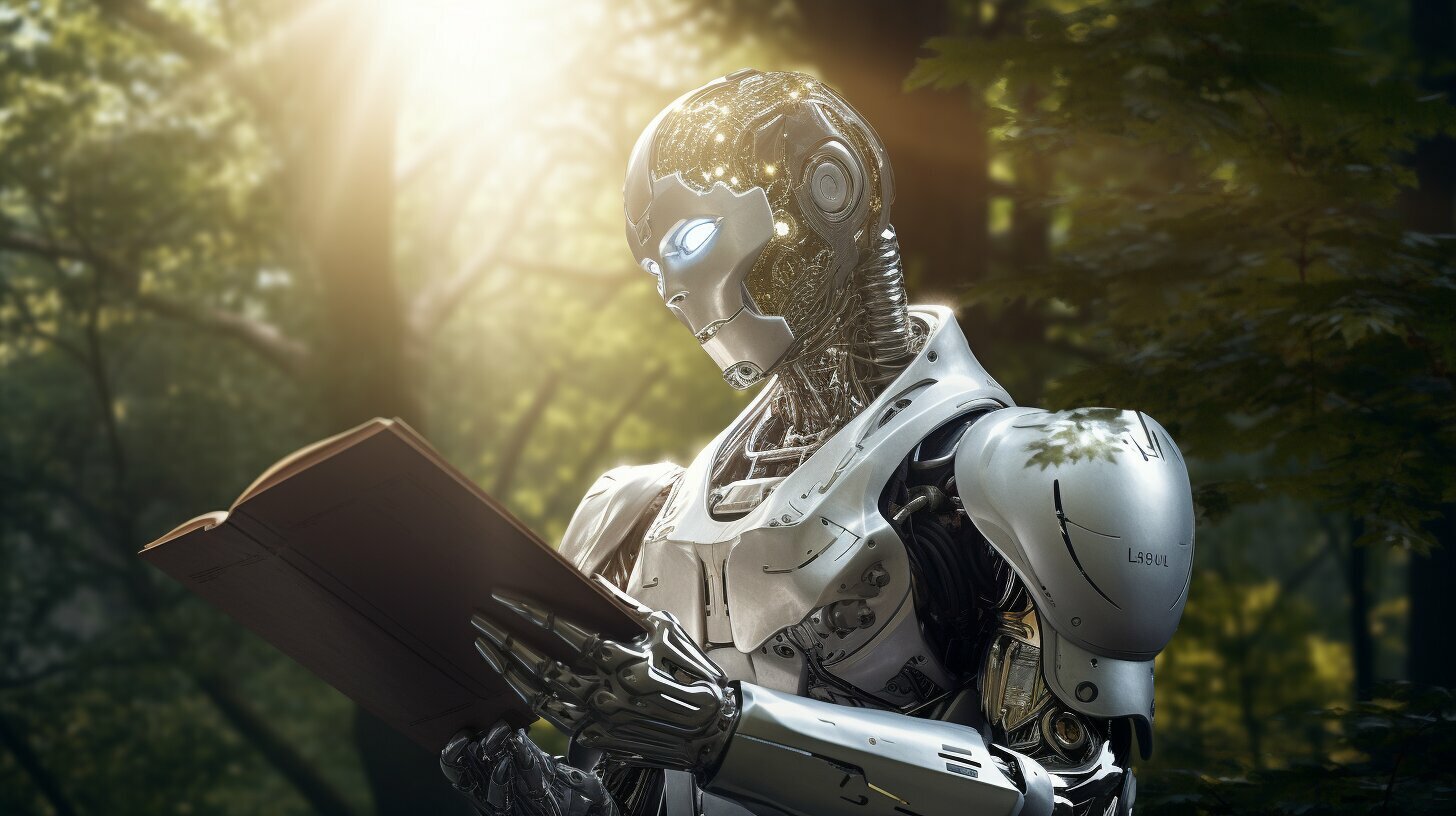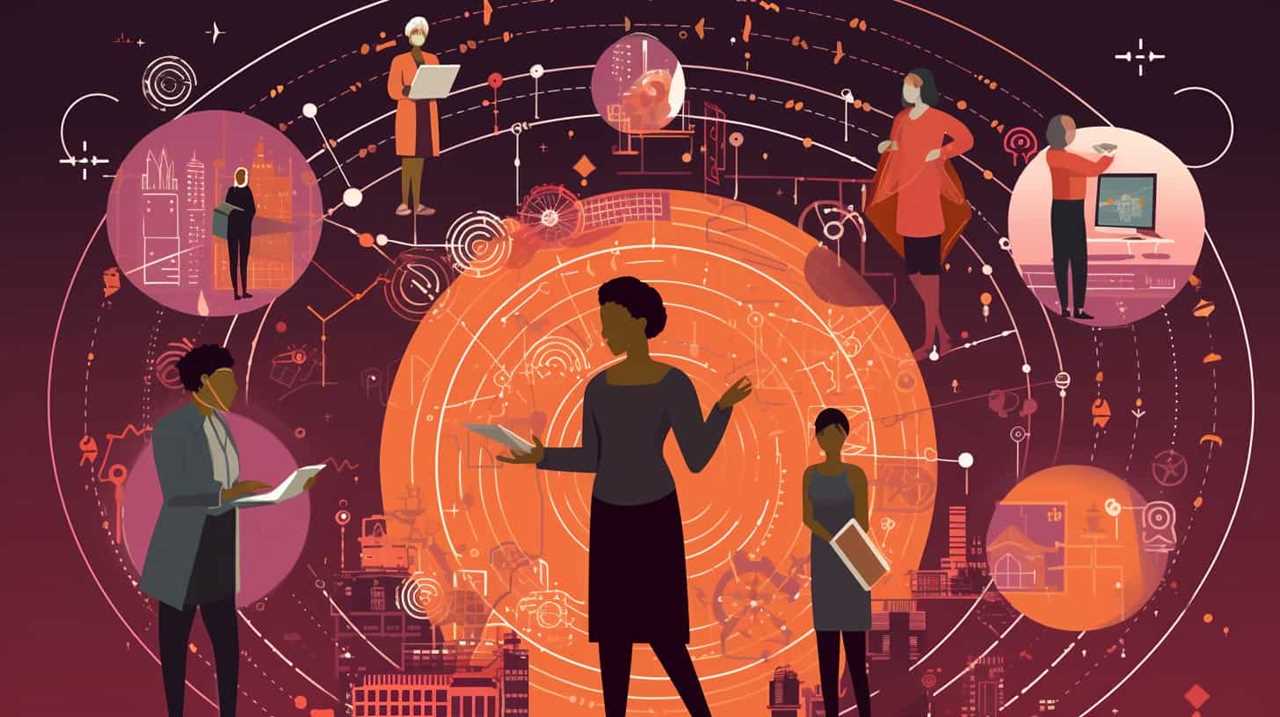As technology continues to advance, the debate over whether AI can replace human jobs intensifies. In 2024, there are still some professions that are not at risk of being automated, thanks to the unique human qualities they require.
From the delicate care and empathy provided by healthcare professionals to the intricate creativity of artists and designers, there are roles that AI struggles to emulate. These seven job categories not only demand specialized skills but also necessitate a level of emotional intelligence and nuanced decision-making that sets humans apart.
The evolution of AI raises questions about the future of work, prompting us to consider the irreplaceable value of these professions in an increasingly automated world.
Key Takeaways
- Healthcare and therapy professionals offer personalized care driven by intuition and empathy, vital for mental health support.
- Creative professionals' originality and emotional intelligence in problem-solving create unique, resonant work untouched by AI.
- Social workers' human connection, advocacy, and empathy in navigating complex social structures remain irreplaceable.
- Educators and mentors' personalized, holistic approach, emotional intelligence, and critical thinking support students in ways AI cannot replicate.
Healthcare Professionals
In the dynamic landscape of future job markets, healthcare professionals stand as indispensable pillars of expertise, blending intricate knowledge, empathetic connection, and clinical acumen to deliver unparalleled patient care. In the realm of healthcare, where decisions can be a matter of life and death, the human touch, empathy, and sensible hunches play irreplaceable roles that no artificial intelligence (AI) can replicate. While AI can assist in data analysis and provide insights, it cannot replace the intuition and emotional intelligence that healthcare professionals bring to their roles.
Healthcare jobs require a level of intelligence that goes beyond data processing. The complex problem-solving and decision-making skills needed in healthcare settings are deeply rooted in human experience and expertise. Medical professionals use a blend of skills to not only interpret data but also provide personalized care that considers the unique circumstances and emotions of each patient. The expertise and experience of healthcare professionals are essential for effective patient care, making these roles irreplaceable by AI in the foreseeable future.
Creative Professionals

With their unparalleled ability to harness human creativity and emotion, creative professionals in fields such as arts and advertising play an essential role in producing unique and engaging content. They possess a unique set of skills that set them apart from machines and algorithms:
- Creative Thinking: Creative professionals excel in thinking outside the box, coming up with innovative ideas, and pushing boundaries to create original content that resonates with audiences.
- Human Touch and Emotional Intelligence: The human touch and emotional intelligence that creative professionals bring to their work are irreplaceable. Whether it's conveying a brand's message or evoking emotions through art, these qualities add depth and authenticity to their creations.
- Problem Solving with a Unique Perspective: Creative professionals tackle challenges with a fresh and unique perspective. Their ability to solve problems creatively and imaginatively ensures that the end product is not just functional but also captivating and memorable.
Therapists and Counselors
In the realm of therapy and counseling, the intricacies of human emotions cannot be underestimated; it is the ability to discern these emotional nuances that sets therapists and counselors apart. The essential role of human empathy in providing support and care cannot be replicated by AI, emphasizing the irreplaceable nature of these professions.
Establishing personal connections with individuals is not just beneficial but crucial in the therapeutic process, underscoring the unique value that therapists and counselors bring to the table.
Emotional Nuances Matter
Embodying the essence of human connection and empathy, therapists and counselors navigate the intricate landscape of emotional nuances to provide unparalleled support in mental health care. They offer personalized care that AI cannot replicate, fostering trust and creating safe spaces for individuals.
The emotional understanding they bring to sessions goes beyond words, allowing them to adapt their approach based on nonverbal cues, which is a skill beyond current AI capabilities. The therapeutic relationship they build is rooted in human empathy and genuine connection, making their role indispensable in mental health treatment.
In a world where emotional well-being is paramount, therapists and counselors stand out for their ability to provide holistic and compassionate care that transcends technological limitations.
Key Points:
- Personalized care fosters trust and creates safe spaces.
- Nonverbal cues guide therapists in adapting their approach effectively.
- Human empathy and genuine connection are indispensable in mental health care.
Human Empathy Essential
Human empathy serves as a cornerstone for therapists and counselors as they forge meaningful connections with clients on a profound emotional level. Through extensive research and honed emotional intelligence, therapists and counselors excel in providing essential mental health support. Their ability to engage in deep human interaction, demonstrating genuine empathy, is a skill that AI cannot replicate. The nuanced understanding of individual emotions and the tailored care they offer are irreplaceable. Below is a table highlighting the key differences between therapists/counselors and AI in the realm of mental health support:
| Aspect | Therapists/Counselors | AI |
|---|---|---|
| Emotional Intelligence | High | Limited |
| Empathy | Genuine | Simulated |
| Human Interaction | Deep connections | Surface-level |
| Tailored Care | Individualized treatment plans | Generalized responses |
Personal Connections Crucial
Demonstrating genuine empathy and fostering personal connections are pivotal aspects of the indispensable roles therapists and counselors play in providing effective mental health support. These professionals excel in understanding human behavior, offering nuanced support, and creating therapeutic relationships that are built on trust and empathy.
The following points highlight why AI cannot replace therapists and counselors in forming these essential personal connections:
- Human Empathy: Therapists and counselors rely on their innate ability to empathize and connect with individuals on a deep emotional level.
- Emotional Connection: Establishing a profound emotional connection with clients is crucial in therapy, something that AI lacks the capacity to achieve.
- Personalized Care: Providing tailored interventions and personalized care is a fundamental aspect of therapy that requires a human touch to address individual needs effectively.
Social Workers

Social workers play a vital role in providing essential emotional support and advocacy for individuals and communities facing various challenges. Their work involves assessing the needs of clients, creating treatment plans, and linking them to necessary resources and support services.
In this demanding field, social workers rely heavily on their empathy, communication skills, and ability to navigate intricate social structures. The human connection and understanding that social workers bring to their interventions and client relationships are irreplaceable by AI.
As societal challenges persist and the demand for mental health services continues to rise, the significance of social workers only grows. AI may assist in some aspects, but the core of social work, which is built on genuine emotional support and personalized advocacy, remains distinctly human.
The unique blend of skills possessed by social workers makes them indispensable in addressing the complex needs of individuals and communities in distress.
Caregivers for Elderly and Disabled

Amidst the increasing demand for caregiving services driven by aging populations globally, the essential role of caregivers for elderly and disabled individuals remains irreplaceable by artificial intelligence. Caregivers provide personalized care, emotional support, and companionship, catering to diverse needs that require a level of human empathy only humans can offer. The job security in this sector is solidifying due to the growing necessity for individuals who can provide not only physical assistance but also the emotional connection crucial for the well-being of the elderly and disabled.
- Human Empathy: Caregivers offer a level of empathy and understanding that AI cannot replicate, creating a unique bond with those they care for.
- Personalized Care: Tailoring care to the individual needs of each elderly or disabled person is a fundamental aspect of caregiving that requires a human touch.
- Emotional Support and Companionship: Beyond physical assistance, caregivers provide emotional support and companionship, fulfilling deeply human needs that go beyond mere practical tasks.
Teachers and Educators

Teachers and educators are irreplaceable due to their unique ability to forge genuine human connections with students, a crucial element in effective education.
Their emotional intelligence allows them to understand and cater to the diverse needs of learners, providing support beyond what AI can offer.
The adaptability teachers demonstrate in tailoring their approach to individual student requirements underscores the intricate nature of their profession that remains beyond the reach of artificial intelligence.
Human Connection in Education
As guardians of knowledge and architects of inspiration, educators forge invaluable human connections that transcend the boundaries of artificial intelligence in the realm of education. Teachers provide personalized learning experiences, display emotional intelligence, and offer mentorship, nurturing holistic development in students.
Here's why human connection in education is irreplaceable:
- Personalized Learning: Teachers tailor their approaches to meet individual student needs, creating unique learning experiences.
- Emotional Intelligence and Empathy: Educators create supportive environments that motivate and inspire students through understanding and empathy.
- Critical Thinking and Mentorship: Teachers play a vital role in developing critical thinking skills, offering mentorship, guidance, and encouragement that AI cannot replicate.
Emotional Intelligence Essential
In the realm of education, the cultivation of emotional intelligence stands as a cornerstone for teachers and educators, fostering invaluable connections that transcend the capabilities of artificial intelligence. Educators harness the power of empathy, the human touch, and social skills to create a supportive and enriching learning environment. Their adaptability and intuitive understanding of students' emotions enable them to guide holistic growth, shaping not just academic success but also emotional well-being.
AI may provide information, but it lacks the capacity to truly understand and cater to individual emotional needs. The intricate dance between knowledge and emotional support that educators perform is what nurtures students' overall development, making their role indispensable in the educational landscape.
Adaptability to Student Needs
Excelling in the art of adapting educational content and methods to cater to diverse student needs, educators demonstrate a dynamic and personalized approach that remains unmatched by artificial intelligence. They provide personalized support, empathy, and emotional connection, fostering critical thinking, creativity, and problem-solving skills that AI cannot replicate.
Human teachers play a vital role in nurturing social and emotional development in students, an aspect where AI lacks the necessary depth. The interactive and dynamic nature of teaching requires human educators to navigate complex learning environments effectively, making adaptability a crucial skill in meeting the unique requirements of each student.
Through their personalized approach, educators create a supportive environment that encourages growth and learning beyond just academic knowledge.
Skilled Tradespeople

Skilled tradespeople epitomize the indispensable blend of hands-on expertise and specialized knowledge that remains beyond the reach of artificial intelligence. Professionals such as electricians and plumbers rely on their intricate understanding of their craft, honed through years of experience, to tackle complex challenges effectively. Their work environments are often unpredictable, requiring quick problem-solving and adaptability—traits that AI struggles to replicate. The demand for skilled tradespeople continues to soar as their unique skills are irreplaceable in providing essential services across various industries.
What sets skilled tradespeople apart is their unmatched creativity, intuition, and craftsmanship. These qualities are fundamental to their success and cannot be emulated by AI. Whether it's designing intricate electrical systems or troubleshooting complex plumbing issues, the human touch and expertise that skilled tradespeople bring to their work ensure their continued relevance in the workforce. In a world increasingly dominated by technology, the role of skilled tradespeople stands as a testament to the enduring value of human skill and ingenuity.
Frequently Asked Questions
What Will AI Do With Jobs?
AI will redefine job roles by automating routine tasks, boosting efficiency, and enhancing decision-making. It will necessitate upskilling and a blend of human-AI collaboration for success. New industries and job roles will emerge, demanding versatile skills.
What Are Some Jobs That AI Can't Replace?
In the realm of employment, certain roles remain impervious to the encroachment of artificial intelligence. Jobs requiring intricate human interaction, strategic acumen, creativity, and empathy, such as Human Resource Managers, Writers, and Healthcare professionals, elude AI's reach.
What Jobs Are AI Proof?
Certain professions remain resistant to AI due to their reliance on high emotional intelligence, strategic decision-making, creativity, problem-solving, critical thinking, and unique human skills like communication and innovation. Jobs like Human Resource Managers, Sales Managers, Writers, and Editors are AI-proof.
What AI Can Really Do Right Now?
AI can currently excel in data analysis, language translation, image and voice recognition, automating routine tasks, and enhancing customer service with chatbots. Its applications span healthcare, finance, marketing, and more, driving efficiency and innovation.
Conclusion
In conclusion, while AI technology continues to advance, there are certain job roles that require uniquely human qualities that cannot be easily replicated. These roles, such as healthcare professionals, creative professionals, and caregivers, rely on empathy, creativity, and personal connection that are essential in providing quality care and support.
Despite the capabilities of AI, these roles will remain irreplaceable in 2024 and beyond, ensuring the importance of human touch in various industries.









